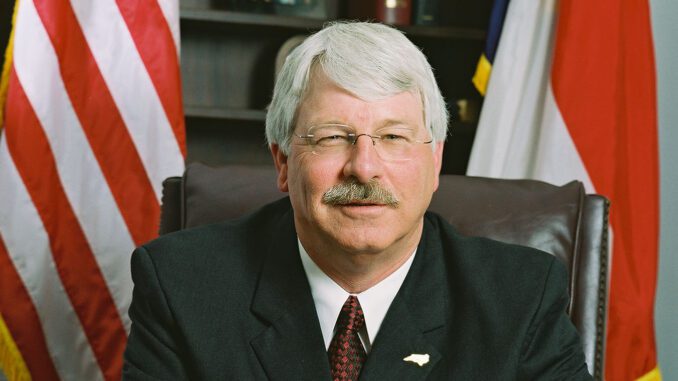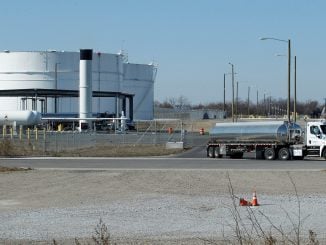
RALEIGH — While 2020 was a hard year for most industries, North Carolina Agriculture Commissioner Steve Troxler, a Republican in his fifth term, said there are very promising signs for the state’s farmers and their agricultural products. In remarks during his annual “state of agriculture” speech, Troxler looked back at recent challenges but made clear he thinks the best days are ahead for North Carolina agriculture.
“As I thought about these comments and looking ahead to 2021 and beyond, I cannot help but think about the challenges we faced in 2020. And, maybe most importantly, how we responded to those challenges,” Troxler said.
He then quoted an unknown author, who said, “Sometimes we’re tested not to show our weaknesses, but to discover our strengths.” Troxler said this quote “certainly applies to North Carolina agriculture, to North Carolina’s farming community and North Carolina’s farmers” during the COVID pandemic.
He commended farmers for “stepping up to the challenges and finding workable answers” during the trying time.
One challenge the industry has dealt with is outbreaks in processing facilities. Troxler said, “Having a healthy workforce is absolutely essential to agriculture and to our food supply” and his office is “in regular communication with state health officials advocating for priority status for agricultural workers.”
He stressed that “We will eventually move past this pandemic,” and “North Carolina’s farming community will emerge stronger as a result.”
The current numbers for the state’s agriculture show that it is the No. 1 industry overall, at $92.7 billion and that it employs about one fifth of North Carolina’s workforce.
“I believe we will soon reach $100 billion in economic impact, thanks to the continued investment in agricultural research, coupled with innovation in food production and manufacturing,” Troxler said.
He said there are a lot of untrue narratives being repeated by “well-fed activists who want us all to believe Old MacDonald is still farming the same way he did 30 to 40 years when they were reading that children’s book.”
Instead, Troxler says the industry is a modern, environmentally conscious, vitally important part of the state’s economy.
“It bothers me when people talk about agriculture and agribusiness being an industry of our past,” Troxler said. “I would argue that nothing is more current or relevant than food production. Nothing.”
He went on to note that the United Nations projects the world needs to increase food production by up to 100% to meet growing demand. With only 2% of the population working to feed the other 98%, Troxler said it’s important not to look at the industry as being a relic of the past.
“I see young people returning to their agricultural roots armed with, and applying, the latest technology and advances on their family farms; consumers who are interested in supporting local farmers; continued investment in agriculture by our legislature; and I see the resources, innovation and training coming from our agricultural universities.”
A positive sign that Troxler pointed to was the recent rise in commodity prices, including on grain, cotton and peanuts.
“Most Virginia-type peanut contracts are in the $520-per-ton range, a rise of close to $100 per ton over the previous several years,” Troxler said. “Rising commodity prices should help provide balance to production, rather than seeing large shifts as farmers move from one commodity to another.”
International exports have also begun to pick up, with China increasing their reliance on North Carolina tobacco and increasing their pork and poultry demands by 20% each over 2020. Also, the Middle East is beginning to import sweet potatoes from the state.
“We have moved to virtual trade shows and missions, expanding company participation. Companies that could not travel can get on a Zoom meeting and meet buyers from around the world,” Troxler said. “Later this month, we are having a virtual trade show with Argentina, which before, never would have happened.”
Troxler also said with a new presidential administration, they are “continuing to closely watch changes and new appointments.” He said while “it’s a little too early to know exactly what will be in the upcoming Farm Bill or changes in agriculture,” they are expecting climate change to have a major impact on the Biden administration’s agriculture policy.
With Biden choosing N.C.’s Department of Environmental Quality (DEQ) secretary, Michael Regan, to head the Environmental Protection Agency (EPA), Troxler is “looking forward to working with him” and believes this North Carolina connection will be valuable.
Continuing on the topic of the environment, Troxler finished his statements by speaking about the Forest Development Program, which has funded tree planting in North Carolina since 1977. He said the program is a partnership between landowners and the N.C. Forest Service, but is underfunded. Despite this, Troxler said in 2018-2019, the program led to 10.48 million tree seedlings being planted on about 17,213 acres in the state and 12.98 million tree seedlings on about 21,286 acres in 2019-2020.
“I am excited about the future of agriculture, and I am committed to making sure we have the natural resources and infrastructure in place for continued success for agriculture and agribusinesses,” Troxler said. “I know the road ahead will not be easy or without challenges, but I know our farmers and our agribusiness owners are up to the task. 2020 has tested all of us, but I believe it has shown us our strengths, too.”


